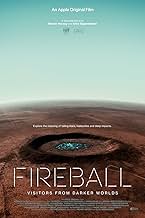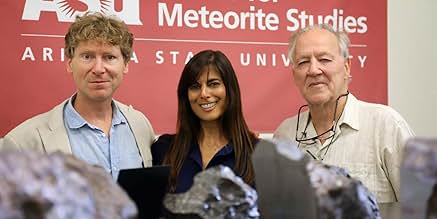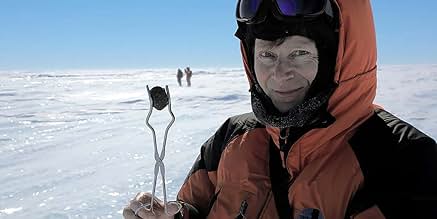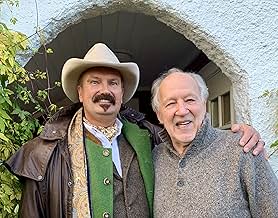Fireball: messaggeri dalle stelle
Titolo originale: Fireball: Visitors from Darker Worlds
VALUTAZIONE IMDb
6,9/10
3986
LA TUA VALUTAZIONE
Un nuovo documentario di Werner Herzog su meteore e comete e la loro influenza sulle antiche religioni e altri impatti culturali e fisici che hanno avuto sulla Terra.Un nuovo documentario di Werner Herzog su meteore e comete e la loro influenza sulle antiche religioni e altri impatti culturali e fisici che hanno avuto sulla Terra.Un nuovo documentario di Werner Herzog su meteore e comete e la loro influenza sulle antiche religioni e altri impatti culturali e fisici che hanno avuto sulla Terra.
- Regia
- Sceneggiatura
- Star
- Premi
- 2 candidature totali
Recensioni in evidenza
Another documentary on Apple TV, shamefully this is the first Werner Herzog documentary that I've seen. If they're all as enjoyable as this one, I'll start hunting down a few more.
The Documentary sees Herzog and his scientific collaborator Clive Oppenheimer travel the world looking at the impact, physically, culturally and spiritually, that Meteors and Comets have had on the Earth. From scientific studies, both low and high tech, to the effect that Meteors have had on the storytelling of remote Pacific tribes, they explore with a sense of wonder and with Herzog's deadpan delivery of the voiceovers.
As Documentaries go, "Fireball" takes rather a scattershot approach to investigating all the ways that Meteorites and Asteroids have affected our planet, it's never less than beautiful though - as our heroes circumnavigate the globe meeting scientists, theologians and tribesman to hear stories, theories and facts about the subject. We see a wide range of vistas and landscapes all wonderfully caught on camera and occasionally with the excellent use of a drone.
A little of the documentaries style takes some getting used to. Herzog likes to hold uncomfortably long shots on the interview subjects, whilst he explains in voice over who they are and why they went to see them. Oppenheimer actually conducts most of the interviews, in a light chatty fashion which I think helps to put a few of the more awkward subjects at ease, there's also a lovely moment towards the end when he finds a large Meteorite in the polar icecaps. Herzog's Bavarian brogue takes a little getting used to, but once I was, I really loved it and he's really very funny, with odd little asides and descriptions of the action that genuinely made me laugh out loud a few times.
It's not quite as deep in some areas as I might have liked, but it's as enthusiastic and enamoured with its subject as any documentary I've seen in a long time.
The Documentary sees Herzog and his scientific collaborator Clive Oppenheimer travel the world looking at the impact, physically, culturally and spiritually, that Meteors and Comets have had on the Earth. From scientific studies, both low and high tech, to the effect that Meteors have had on the storytelling of remote Pacific tribes, they explore with a sense of wonder and with Herzog's deadpan delivery of the voiceovers.
As Documentaries go, "Fireball" takes rather a scattershot approach to investigating all the ways that Meteorites and Asteroids have affected our planet, it's never less than beautiful though - as our heroes circumnavigate the globe meeting scientists, theologians and tribesman to hear stories, theories and facts about the subject. We see a wide range of vistas and landscapes all wonderfully caught on camera and occasionally with the excellent use of a drone.
A little of the documentaries style takes some getting used to. Herzog likes to hold uncomfortably long shots on the interview subjects, whilst he explains in voice over who they are and why they went to see them. Oppenheimer actually conducts most of the interviews, in a light chatty fashion which I think helps to put a few of the more awkward subjects at ease, there's also a lovely moment towards the end when he finds a large Meteorite in the polar icecaps. Herzog's Bavarian brogue takes a little getting used to, but once I was, I really loved it and he's really very funny, with odd little asides and descriptions of the action that genuinely made me laugh out loud a few times.
It's not quite as deep in some areas as I might have liked, but it's as enthusiastic and enamoured with its subject as any documentary I've seen in a long time.
It's purely a coincidence that I am reviewing two documentary features in a row - partly brought on by the fact that I don't yet know where to see The Climb or Wolfwalkers. But following up I Am Greta, a movie that wants us to be really sad about the state of the planet, with one that sometimes basks in the Earth's inconsequentiality next to the rest of the Universe (not that this means we shouldn't treasure it; quite the opposite) was an amusing line-up.
There are very few filmmakers who resonate with me in the same way as Werner Herzog, the German legend who all but dominates the very documentary genre. This isn't because I always admire his films, but rather because of the way the indifference of the unfeeling cosmos seems to fascinate him - along with things that are strange and non-human, including grizzly bears and Baby Yoda.
Herzog finds glee where others are brought despair. The non-discriminating, inevitable reality of death, and the chaotic forces that may one day annihilate all of us in a single swoop (no matter how important we deem ourselves, or how desperately we believe in divine reward and greater purpose), are depressing reminders to some, while others look at them with fascinated awe. The only thing I like more about Herzog is the accent.
In Fireball: Visitors From Darker Worlds (viewable on Apple TV), Herzog looks at meteors, as well as the sort of people who have made it their life to look at meteors. We also learn what meteor strikes have come to mean for various hopeful cultures and individuals around our spheroid (a museum in France even carries a message for potential alien visitors, meant to be found if we don't survive the next asteroid hit, and Herzog expectedly jokes about the optimism in the faith that aliens will understand Modern French).
Some peoples have taken meteorites as a sign of our importance (a message from Someone Greater), whereas scientists might take it as a sign that there is insurmountably more to existence than humanity - which is fine.
At Herzog's side is volcanologist Clive Oppenheimer; not to be confused with Joshua Oppenheimer, another giant in the world of documentary film (Herzog was an executive producer on his masterfully disturbing Look of Silence in 2015). But as documentary films go, Fireball is indeed made with expertise, focusing on well-selected subjects and being very well-shot (I found the use of drone cameras to be unusually effective, adding some "size" to our aforementioned spec of a home by transitioning from space rock close-ups to long-shots of an Alsatian vista).
Many of the characters we meet are as fascinating as the very exploration of meteorides and forces immeasurably older than ourselves - particularly delightful, in my opinion, is the Norwegian man who revolutionized the research of so-called micrometeorites; items that fell from space, scarcely the size of a dust grain. A character we don't see enough of, according to some reviewers, is Herzog himself.
But following Oppenheimer (who conducts most of the interviews) is fun too, and Herzog's narrations are more than enough this time. The essentials are still there. We are still very much reminded that, sometimes, the things that make us seem so unfathomably small can also make us feel so unfathomably lucky that we're alive to explore them; that we exist in an age with the right tools; that our place in the solar system even allowed for evolution to reach this point; that the latest Apollo asteroid strike, a moment of immense destruction, made it so we could eventually live.
Who knows? There may even be a reason these stones made their way to humankind after all; something that made them seek us out. Then again, I might just have watched too much Goop Lab to be entirely rational. I hereby issue my apologies for that last bit.
A quick note, just so I can flex my knowledge since kidhood: I have not misspelled the word "meteorite" when speaking of "meteorides" earlier in this post. A meteoride is a piece of space debris (usually from a comet or asteroid, both of which distinguish themselves from meteorides in that they actually orbit a star) that becomes a METEOR when entering a planet's atmosphere, and METEORITE if it lands on the surface.
There are very few filmmakers who resonate with me in the same way as Werner Herzog, the German legend who all but dominates the very documentary genre. This isn't because I always admire his films, but rather because of the way the indifference of the unfeeling cosmos seems to fascinate him - along with things that are strange and non-human, including grizzly bears and Baby Yoda.
Herzog finds glee where others are brought despair. The non-discriminating, inevitable reality of death, and the chaotic forces that may one day annihilate all of us in a single swoop (no matter how important we deem ourselves, or how desperately we believe in divine reward and greater purpose), are depressing reminders to some, while others look at them with fascinated awe. The only thing I like more about Herzog is the accent.
In Fireball: Visitors From Darker Worlds (viewable on Apple TV), Herzog looks at meteors, as well as the sort of people who have made it their life to look at meteors. We also learn what meteor strikes have come to mean for various hopeful cultures and individuals around our spheroid (a museum in France even carries a message for potential alien visitors, meant to be found if we don't survive the next asteroid hit, and Herzog expectedly jokes about the optimism in the faith that aliens will understand Modern French).
Some peoples have taken meteorites as a sign of our importance (a message from Someone Greater), whereas scientists might take it as a sign that there is insurmountably more to existence than humanity - which is fine.
At Herzog's side is volcanologist Clive Oppenheimer; not to be confused with Joshua Oppenheimer, another giant in the world of documentary film (Herzog was an executive producer on his masterfully disturbing Look of Silence in 2015). But as documentary films go, Fireball is indeed made with expertise, focusing on well-selected subjects and being very well-shot (I found the use of drone cameras to be unusually effective, adding some "size" to our aforementioned spec of a home by transitioning from space rock close-ups to long-shots of an Alsatian vista).
Many of the characters we meet are as fascinating as the very exploration of meteorides and forces immeasurably older than ourselves - particularly delightful, in my opinion, is the Norwegian man who revolutionized the research of so-called micrometeorites; items that fell from space, scarcely the size of a dust grain. A character we don't see enough of, according to some reviewers, is Herzog himself.
But following Oppenheimer (who conducts most of the interviews) is fun too, and Herzog's narrations are more than enough this time. The essentials are still there. We are still very much reminded that, sometimes, the things that make us seem so unfathomably small can also make us feel so unfathomably lucky that we're alive to explore them; that we exist in an age with the right tools; that our place in the solar system even allowed for evolution to reach this point; that the latest Apollo asteroid strike, a moment of immense destruction, made it so we could eventually live.
Who knows? There may even be a reason these stones made their way to humankind after all; something that made them seek us out. Then again, I might just have watched too much Goop Lab to be entirely rational. I hereby issue my apologies for that last bit.
A quick note, just so I can flex my knowledge since kidhood: I have not misspelled the word "meteorite" when speaking of "meteorides" earlier in this post. A meteoride is a piece of space debris (usually from a comet or asteroid, both of which distinguish themselves from meteorides in that they actually orbit a star) that becomes a METEOR when entering a planet's atmosphere, and METEORITE if it lands on the surface.
Tiff 2020 02
Fireball: Visitors from Darker Worlds
It's always a joy to listen to Werner Herzog as he goes through his subjects and narrates them and you can see his passion, his excitement for finding unique, hard to find little stories about science, about people around the world and to retell them through his filmmaking skills, to try to share that beautiful things he found in his journey.
However, this film is a bit formless and weak on structure and layout. Herzog and his co-director Clive Oppenheimer just go interview some knowledgeable people and scientists about asteroids and meteorites. There's no arc and momentum about this film, it's just a collection of interviews, locations and some information about meteorites. If you already have an interest about them, this is a must see for you, and if not, well, it's a watchable film but not a very deep or memorable one.
Fireball: Visitors from Darker Worlds
It's always a joy to listen to Werner Herzog as he goes through his subjects and narrates them and you can see his passion, his excitement for finding unique, hard to find little stories about science, about people around the world and to retell them through his filmmaking skills, to try to share that beautiful things he found in his journey.
However, this film is a bit formless and weak on structure and layout. Herzog and his co-director Clive Oppenheimer just go interview some knowledgeable people and scientists about asteroids and meteorites. There's no arc and momentum about this film, it's just a collection of interviews, locations and some information about meteorites. If you already have an interest about them, this is a must see for you, and if not, well, it's a watchable film but not a very deep or memorable one.
This film just puts science and fiction into the realms of extraordinary possibilities beyond our own human existence. It is at once real and incredible, probing into the messages from light years away that showcases a magical, if sometimes frightening, expanse that's beyond our wildest imagination. And the real treat, and stunning truth, is that science is showing us how space and the cosmos is so much so connected to us at the core.
Just a rambling montage of bits of information that never seem to have a distinct direction or point. Random. Really disappointing. Was expecting so much more. A solid through line with a cohesive vision, but no, not what this is. It's a mess of a documentary by one of the most renowned documentarians of all time. Sad.
Lo sapevi?
- QuizWill mark the third collaboration between Werner Herzog and Clive Oppenheimer after Dentro l'inferno (2016) and Incontri ai confini del mondo (2007).
- ConnessioniFeatures Deep Impact (1998)
I più visti
Accedi per valutare e creare un elenco di titoli salvati per ottenere consigli personalizzati
Dettagli
- Data di uscita
- Paese di origine
- Lingua
- Celebre anche come
- Fireball: Visitors from Darker Worlds
- Luoghi delle riprese
- Mecca, Arabia Saudita(Kaaba Black Stone)
- Aziende produttrici
- Vedi altri crediti dell’azienda su IMDbPro
- Tempo di esecuzione1 ora 37 minuti
- Colore
Contribuisci a questa pagina
Suggerisci una modifica o aggiungi i contenuti mancanti

Divario superiore
What is the Japanese language plot outline for Fireball: messaggeri dalle stelle (2020)?
Rispondi




















